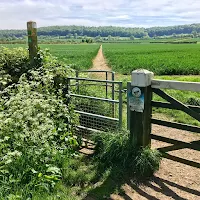9 December 2017: Holy Trinity Church, Stratford-upon-Avon
On 9 September 1742, George Frideric Handel wrote a letter to his close friend (and greatest fan), Charles Jennens, enclosing a glowing review – by “no less than the Bishop of Elphim (A Nobleman very learned in musick)” – of the extremely successful first performance of an oratorio in Dublin. This premiere had actually taken place five months earlier, on 13 April 1742: so it seems that Handel was perhaps a little tardy in informing Jennens just “how well Your Messiah was received”.
Yes… – “Your” Messiah. For it was Jennens who not only compiled the text; but also convinced Handel of the merits of such a work in the first place. It seems, as well, that the composer trusted his collaborator’s knowledge of music, and musical forms, well enough to have asked him for feedback on the final article: as later, he would write to Jennens, asking him to “point out these passages in the Messiah which you think require altering”.
Unfortunately, Jennens doesn’t appear to have considered Messiah one of Handel’s greatest hits (an opinion also held by the first London audiences for the work) – as he wrote to his friend Edward Holdsworth that…
I shall show you a collection I gave Handel, called Messiah, which I value highly. He has made a fine entertainment of it, though not near so good as he might and ought to have done. I have with great difficulty made him correct some of the grossest faults in the composition; but he retained his overture obstinately, in which there are some passages far unworthy of Handel, but much more unworthy of the Messiah.
There is no mention in either of my (extremely well-used) scores of Messiah of the librettist’s name; and it would be easy to dismiss – as many have done – its lyrical content as just a collection of random verses from the Bible loosely stitched together. Additionally – especially for those of us who need more than our hands and feet to count the number of performances we have either attended or taken part in – the words have become so utterly familiar, anyway, that we perhaps take little (if any) notice of their meaning – either as individual movements, or overall.
I would argue, though, that Jennens’ knowledge of scripture; his grasp of dramatic literature (he was the first person to produce scholarly editions of individual Shakespeare plays), and of dramatic music; all come together to produce a cohesive, intelligent, and, in many ways, a quite startling narrative. We have to remember that nothing like this had been produced before (excepting Jennens’ own text for Handel’s Saul, in 1739); and that the first edition of Alexander Cruden’s Complete Concordance To the Old and New Testaments had only just been published (in 1736). But, even then, it has to be acknowledged that Jennens must have known the 1611 King James Version of the Bible – and the versions of the psalms as printed in The Book of Common Prayer of 1662 – inside-out. Indeed, musicologist Watkins Shaw – in The story of Handel's ‘Messiah’ – asserts that the libretto “amounts to little short of a work of genius”. As a writer, I have to agree!
The storyline that Jennens weaves can be seen in more than one light, too – hence its effectiveness. As religious propaganda, it reflects his own feelings concerning religion and society. In structure, it follows the liturgical year: Part I corresponding with Advent and Christmas; Part II with Lent, Easter, the Ascension, and Pentecost; and Part III with the year’s end (as well as ‘The End of Days’). Of course, its main thrust is the rehearsal of the life of Jesus: from Isaiah’s prophecies of a longed-for saviour – of his birth and death – to their fulfilment (in effect, from the First Coming to the Second). However, despite its title, this “life” is only ever really implied – apart from the appearance of the angels to the shepherds (in movements 13 to 17), events are written well and truly between the work’s lines.
As you listen to Handel’s glorious music, tonight, please, therefore, pay attention to those wonderful words, as well as – perhaps more than you would normally – to their meaning, their significance and power. And remember that, to all intents and purposes, without Jennens, there would be no music to hear. Without Charles Jennens, there would be no Messiah.



























